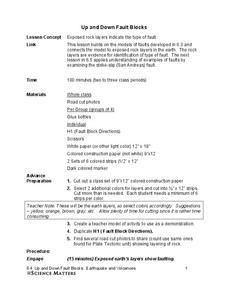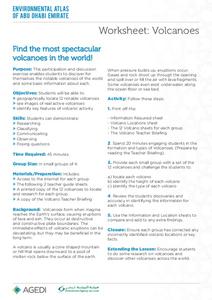Space Awareness
Valleys Deep and Mountains High
Sometimes the best view is from the farthest distance. Satellite imaging makes it possible to create altitude maps from far above the earth. A three-part activity has your young scientists play the role of the satellite and then use...
Curated OER
Volcanoes: Kindergarten Lesson Plans and Activities
In the pre-lab, kindergarteners mimic the movements of the eruption of a volcano and discover various volcanoes around the United States. Then, pupils sort different types of volcanic rocks in the lab before learning how volcanoes grow...
Curated OER
Volcanoes: First Grade Lesson Plans and Activities
Introduce young geologists to types of volcanoes during the pre-lab. First graders explore how different liquids flow with an experiment on viscosity to simulate how different types of lava flow. Next, they learn...
Curated OER
Changing Landforms
Students investigate different types of landforms. In this landforms lesson, students explore landforms by participating in a WebQuest. Students research the reasons behind landforms changing and create a picture using KidPix.
Curated OER
Mountain Man Clothing
Students examine what mountain men wore, and what the clothing looked like. They determine what the special features and purposes had to been included in the clothing. They examine the shirts, breeches, hats, and gloves that were...
Curated OER
Across the Landscape
Students create a unique, stunning display of the Earth's landforms. They discuss the many different types of the Earth's landforms such as deserts, mountains, oceans, plateaus, coastlines, and marshlands. Students discuss what...
Curated OER
I Love the Mountains
First graders discuss and define different landforms. They read the book "Our Land", sing a landform song and perform it with motions and then complete a worksheet.
Curated OER
ReQuest and Motor Imaging with My Side of the Mountain
Fifth graders read "My Side of the Mountain." They create a pantomime using vocabulary words from the story. Students create three questions about the reading. They discuss the passage they read and act out words to help them better...
Science Matters
Up and Down Fault Blocks
The Sierra Mountains in Nevada and the Tetons in Wyoming originally formed as fault block mountains. In order to visualize these fault blocks, pupils use construction paper to create layers of earth. They cut the paper models and form...
Curated OER
How Do Mountains Form?
In this mountain formation worksheet, students will compare the 3 different types of mountains: fold, fault-block, and dome mountains. Students will write their answers in a graphic organizer.
Curated OER
Exploring Hawaiian Mountain Zones
Fourth graders watch a video that describes the climate and vegetation zones of Hawaii. They describe the different physical conditions that create vegetation zones from the sea to the mountains. In groups, they create an illustrated...
Environment Agency - Abu Dhabi
Find the Most Spectacular Volcanoes in the World!
Heat things up in your earth science class with this collaborative lesson on volcanoes. After first being introduced to the different types of volcanoes and how they are formed, young geologists work in small groups to...
Curated OER
Living in the Greenhouse
Students discuss the different types of climate zones found throughout the world. They participate in activities which relate to real events. They make observations and the consequences of their actions on the environment.
Rainforest Alliance
Knowing the Essential Elements of a Habitat
To gain insight into the many different types of habitats, individuals must first get to know their own. Here, scholars explore their school environment, draw a map, compare and contrast their surroundings to larger ones. They then...
K12 Reader
What Glaciers Leave Behind
Glaciers may seem distant and stationary, but they are huge deposits of moving ice that have made changes to the earth's surface. Your pupils can learn about the different types of impressions left by glaciers by reading the short...
Compton Unified School District
How Can We Locate Places?
How can we locate places? Maps, of course! Expose second graders to the tools available in maps and discuss how these tools can help people find locations. Students also look at communities, including what makes a community and the...
US Institute of Peace
Observing Conflict
Identifying conflict is important, but how do you handle conflict when it comes? Students use a plot mountain to graph two role-play scenarios about interpersonal conflicts.
K-State Research and Extensions
The Crusty Earth
Geology rocks — literally! A geology chapter offers eleven activities at four different levels. Scholars enjoy completing hands-on experiments before applying critical thinking skills following a share, process, generalize, apply,...
Curated OER
Cloud Viewer
Fourth graders examine different types of clouds. In this cloud lesson, 4th graders examine pictures of different types of clouds and read details about them in the captions under the images. They make a cloud viewer by cutting out the...
Curated OER
Slippery Slope
Middle schoolers use a computer to complete activitites about slope. They find the slope of mountains, roofs, and stairs using rise over run. Pupils are shown different types of slopes and have to identify if the slope is positive,...
Curated OER
Ecosystems of the World
Students are able to list different ecosystems and describe their environment and organisms. They have an understanding about the function and balance of the ecosystems. Students are able to tell what type of ecosystem the St. Mary's...
Curated OER
Landforms
In this landform review worksheet, students use 17 provided terms to complete a paragraph about different landforms. After filling in the blanks, they name 4 kinds of mountains and provide examples of each.
Science Matters
A Model of Plate Faults
The San Andreas fault is one of the longest fault zones in the world. In a series of 20 lessons, the fourth lesson has pupils use a paper model to recreate various types of plate faults. Each is held in position then drawn...
Curated OER
Rocks and Minerals
First graders examine different types of rocks and minerals. They create models of the rocks and minerals they find interesting. They discuss and explain three ways in which the earth changes.

























